Among gardeners, there’s one question that comes up again and again: how do you get rid of ants in the garden? However, while some ants can cause problems in garden beds, not all ants do. In fact, ants can sometimes benefit plants, and irradicating them from gardens can do more than good.
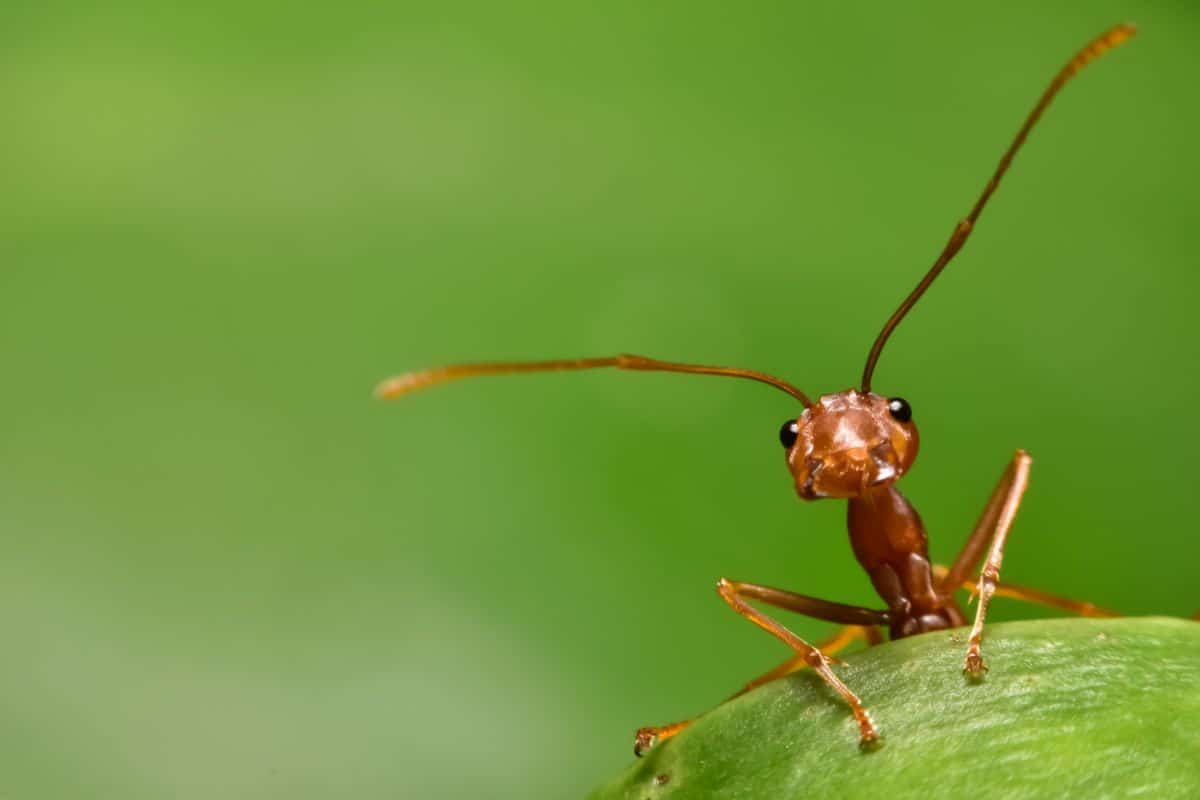
If you’ve ever wondered why ants are congregating on your plants and what to do about them, you’ve come to the right spot! In this guide, we’ll explore the pros and cons of garden ants. We’ll also give some suggestions on how to organically eradicate ants (if you choose to!) without harming bees and other pollinators.
Jump to:
- Are garden ants friends or foes?
- How ants benefit gardens
- How ants harm gardens
- Why are ants on my plant?
- How to get rid of garden ants naturally
- 1. Water often
- 2. Try tilling
- 3. Remove their food sources
- 4. Use boiling water
- 5. Attract natural predators
- 6. Apply repellent scents
- 7. Grow companion plants
- 8. Experiment with cornstarch and cornmeal
- 9. Soap sprays
- 10. Diatomaceous earth
- Frequently asked questions
- Summary
Are garden ants friends or foes?
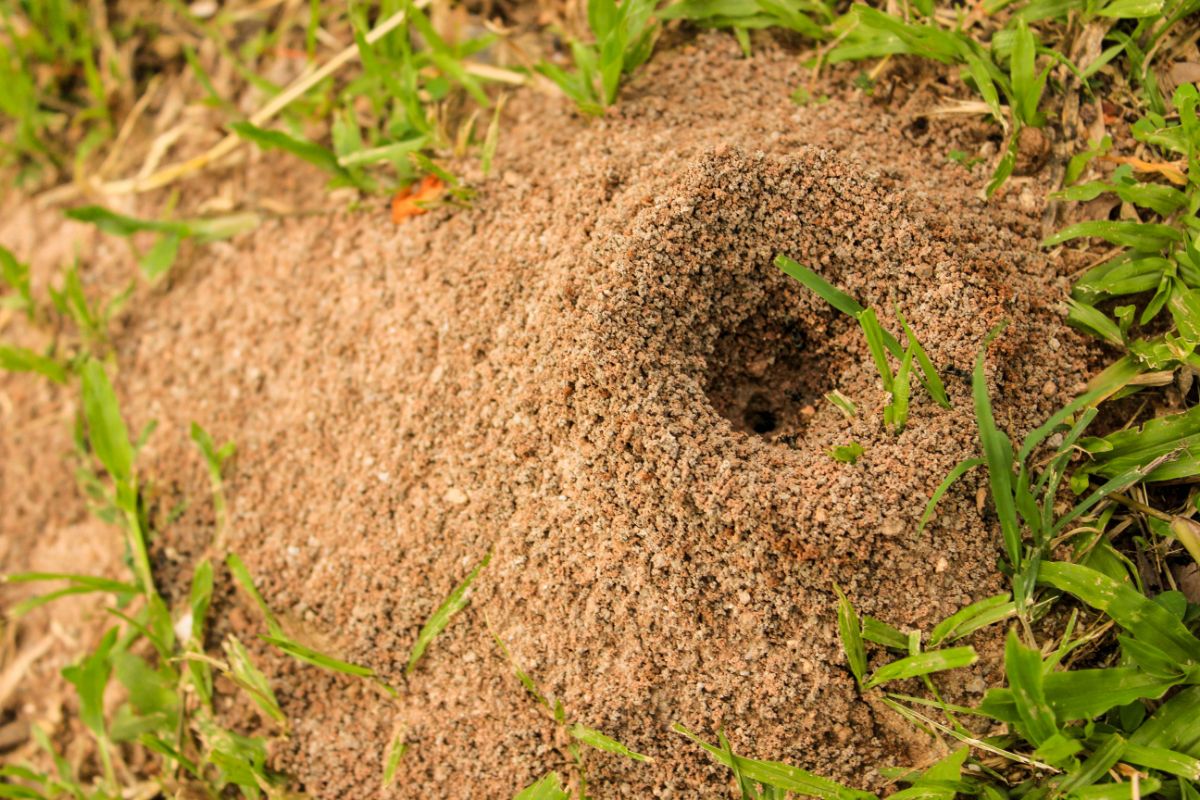
Some ant species, like carpenter ants and fire ants, can cause problems in the garden and leave nasty bites on your skin if you stray too close to them. But most ant species are neutral or even beneficial insects that can actually control other garden pests and help pollinate plants. Considering that ants are a part of the ecosystem and most won’t do any harm, you may not want to remove ant colonies at all.
How ants benefit gardens
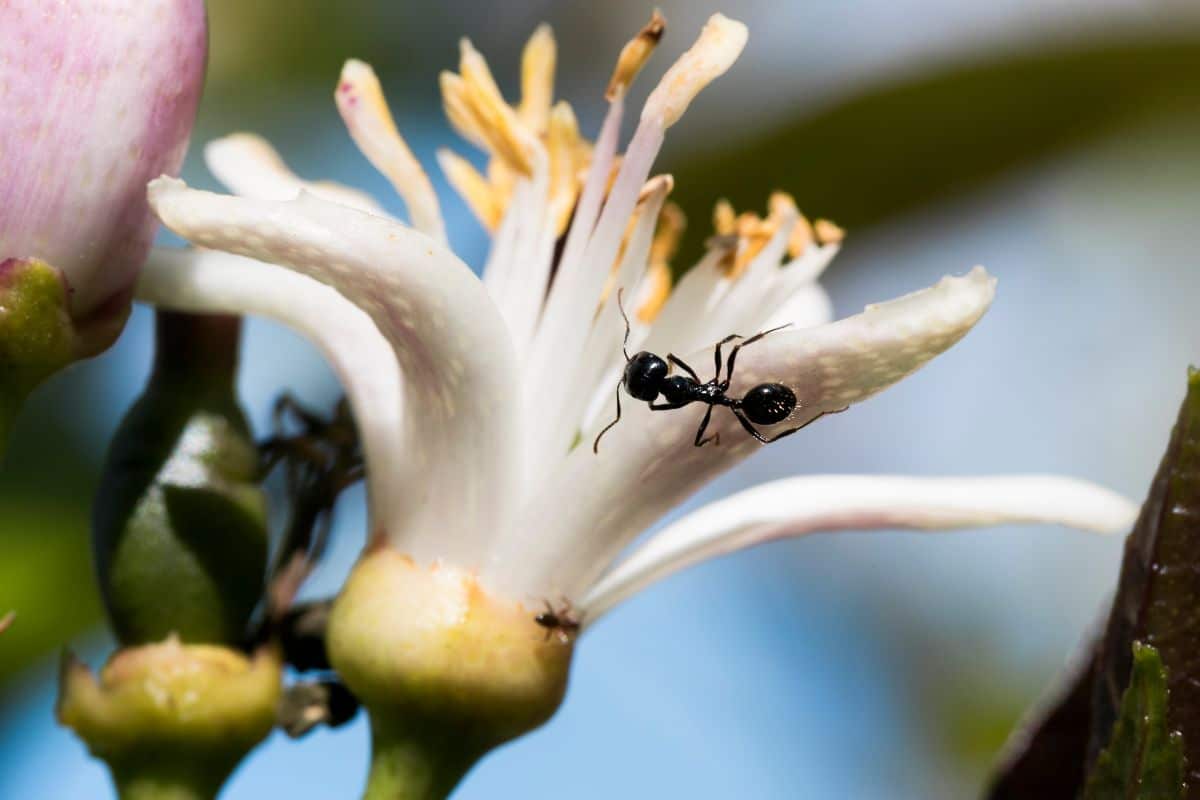
Many ant species actually benefit plants and keep your garden tidy. Some of the main ways ants help out in the garden include:
- Reducing soil compaction. Many ant species live in underground colonies, which are made of a labyrinth of tunnels that snake their way through garden soil. While they build their tunnels, ants actually help loosen up compact soil and make it easy for plant roots to grow and breathe.
- Soil enrichment. Ants scavenge for bits of plant matter and other insects in your garden, and then they carry their findings back to their colony. But ants often don’t eat all of their food, and it eventually breaks down in their tunnels, thereby enriching the surrounding soil and adding nutrients to your plant's roots.
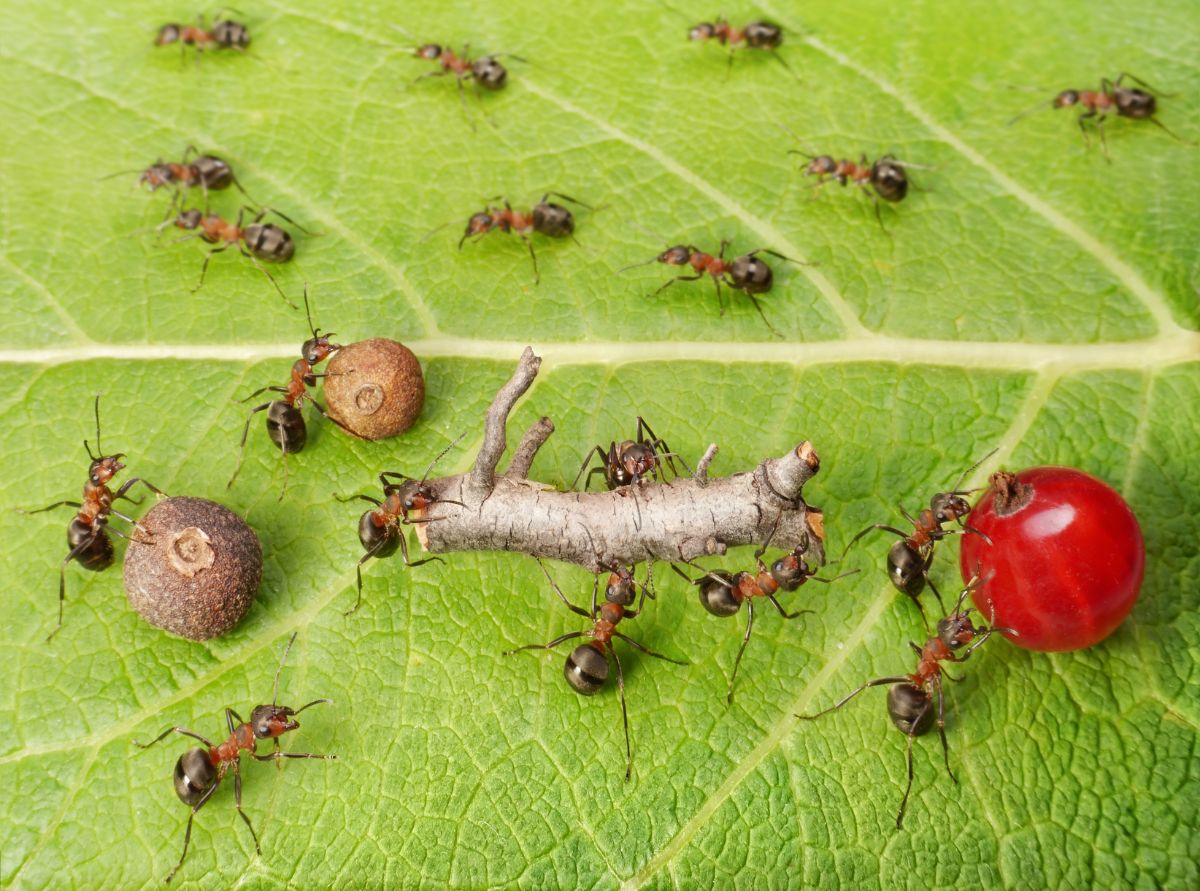
- Garden cleanup. Ants are nature’s decomposers, and they clean up old plant debris, dead insects, and other waste. Even carpenter ants can help break down old and decaying wood, which will keep your garden and yard looking more tidy.
- Keeping pests in check. As omnivores, ants will eat just about anything… including other insects. When allowed to roam, ants feed on cabbage loopers, root maggots, spider mites, beetle grubs, and more, and they can actually protect your plants from predation!
- Pollination. In their search for food, ants will travel all over the place, and they often visit flowers. When they do, ants can transport pollen from plant to plant, effectively pollinating flowers in your garden.
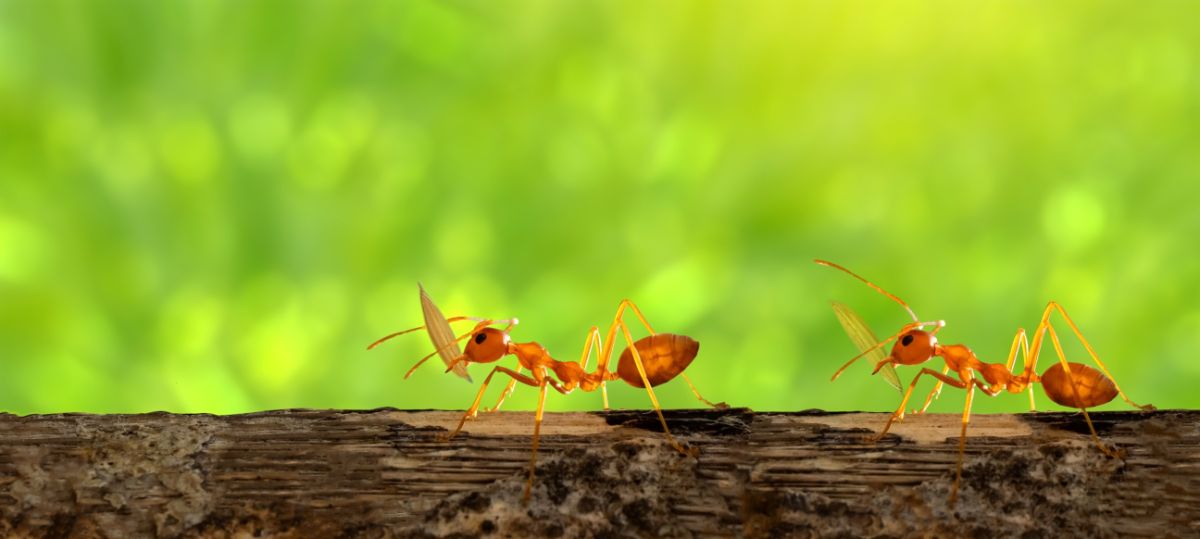
- Seed planting. One often overlooked aspect of ants is that they are prolific seed sowers, and they are actually responsible for planting many native wildflower seeds. In fact, some spring ephemerals, like trilliums, bloodroot, wild ginger, and violets, almost entirely depend on ants to disperse their seeds!
- Food for wildlife. While ants eat other insects, ants are also food for various wildlife species. Birds and beneficial insects like spiders and assassin bugs feast on ants, and they’re more likely to visit gardens where ants are present.
How ants harm gardens
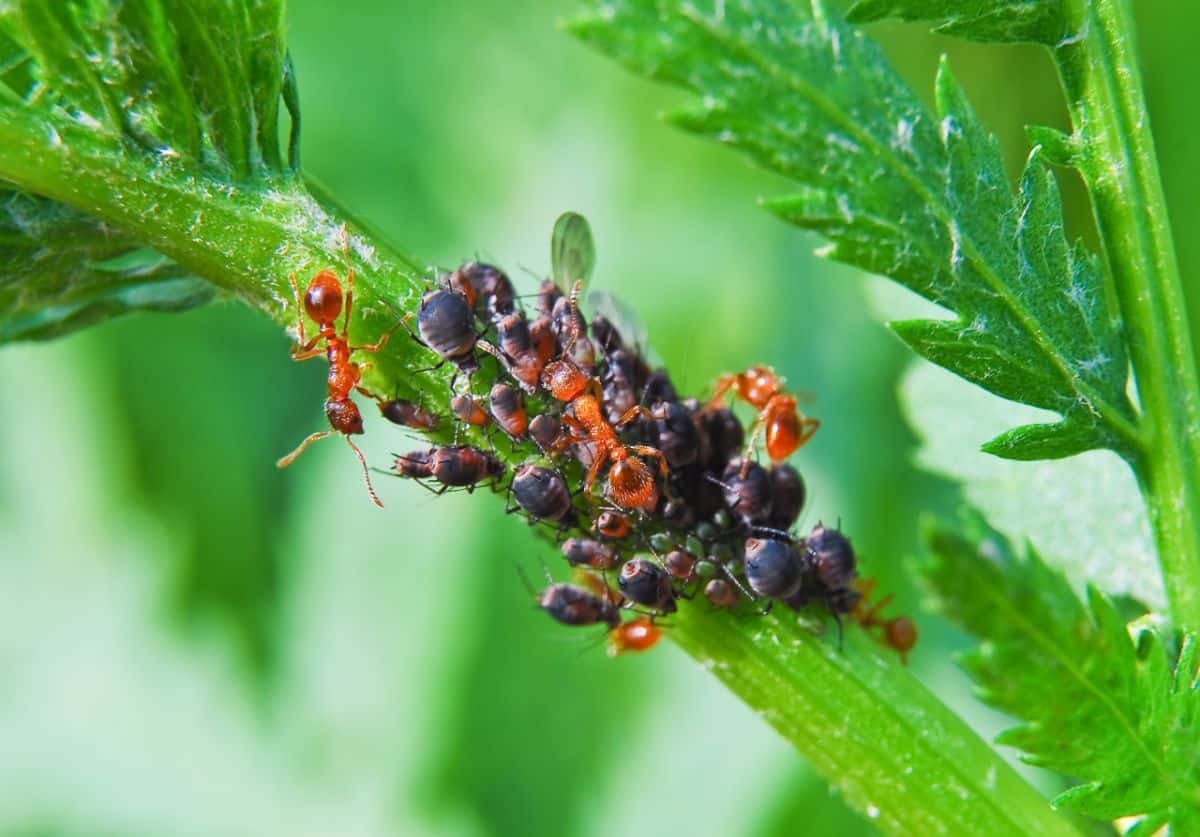
While ants can benefit gardens, some ant species can cause problems in your landscape or make it less pleasant to garden. Weighing these cons against the benefits that ants bring to gardens will help you decide whether or not you want to eradicate your local ant colony.
- Some ants can bite. All ant species can potentially bite humans, although most ants either won’t bite or they won’t cause a reaction when they do. Fire ants and carpenter ants, however, are notorious for their painful bites, which is the last thing you want to experience when digging in your garden bed!
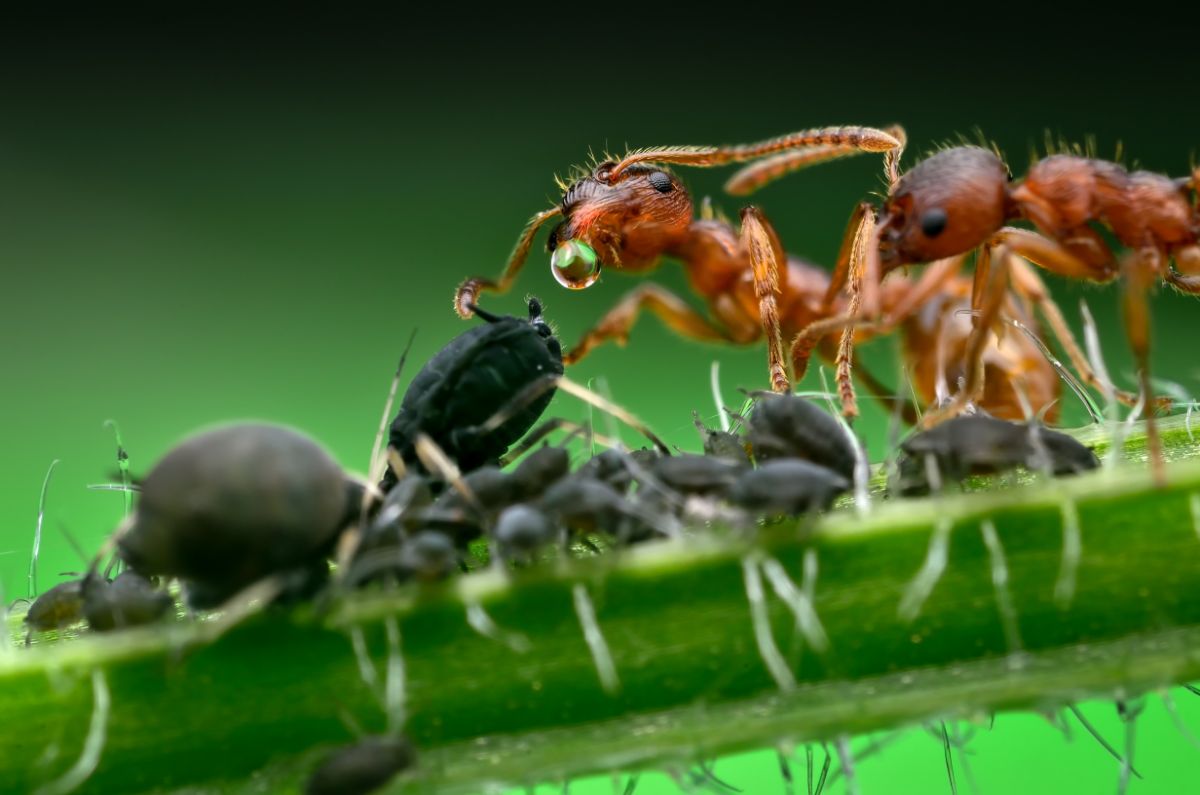
- Some ants can benefit pest insects. Some ant species actually “farm” aphids and other sap-sucking pests and protect them from predatory insects like ladybugs and lacewings (much like how humans keep cows!) If you’ve ever seen ants and aphids congregating on plant stems, it’s likely because the ants are “farming!”
Ants farm aphids and other sap-sucking pests for their sweet honeydew, which they then eat or carry back to their colony. Because ants love this sweet liquid so much, they can fight off aphid predators and cause aphid populations to increase.
- Some ants can cause property damage. Certain ant species, like carpenter ants, will help decaying wood decompose, but they can also cause property damage by digging tunnels in the wood of your home or your raised beds. Mound-building ants can also create massive mounds that some may consider an eyesore.
Why are ants on my plant?
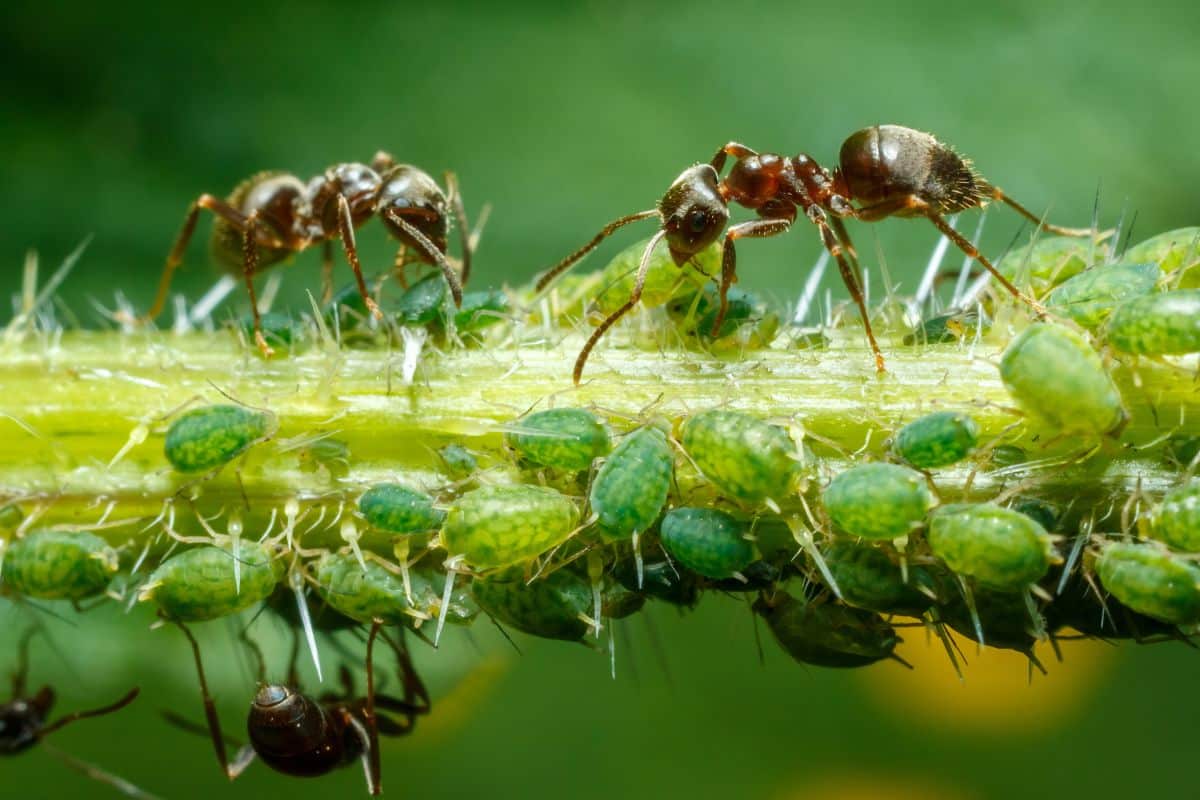
While ants can offer many benefits to the home gardener, one of the most important ways ants “help” us is by letting us know that we have a pest problem. If you are starting to see a lot of ants in your garden, it often indicates that there is a burgeoning population of aphids or other sap-sucking pests nearby. By using ants as a barometer for pest activity, you can act more quickly to eradicate noxious pests, including aphids and mealybugs.
Often when gardeners see ants on their plants, they assume that ants are eating their plant leaves. However, most ants won’t harm plants. That said, finding lots of ants may mean that you should inspect your plants carefully for signs of other pests.
How to get rid of garden ants naturally
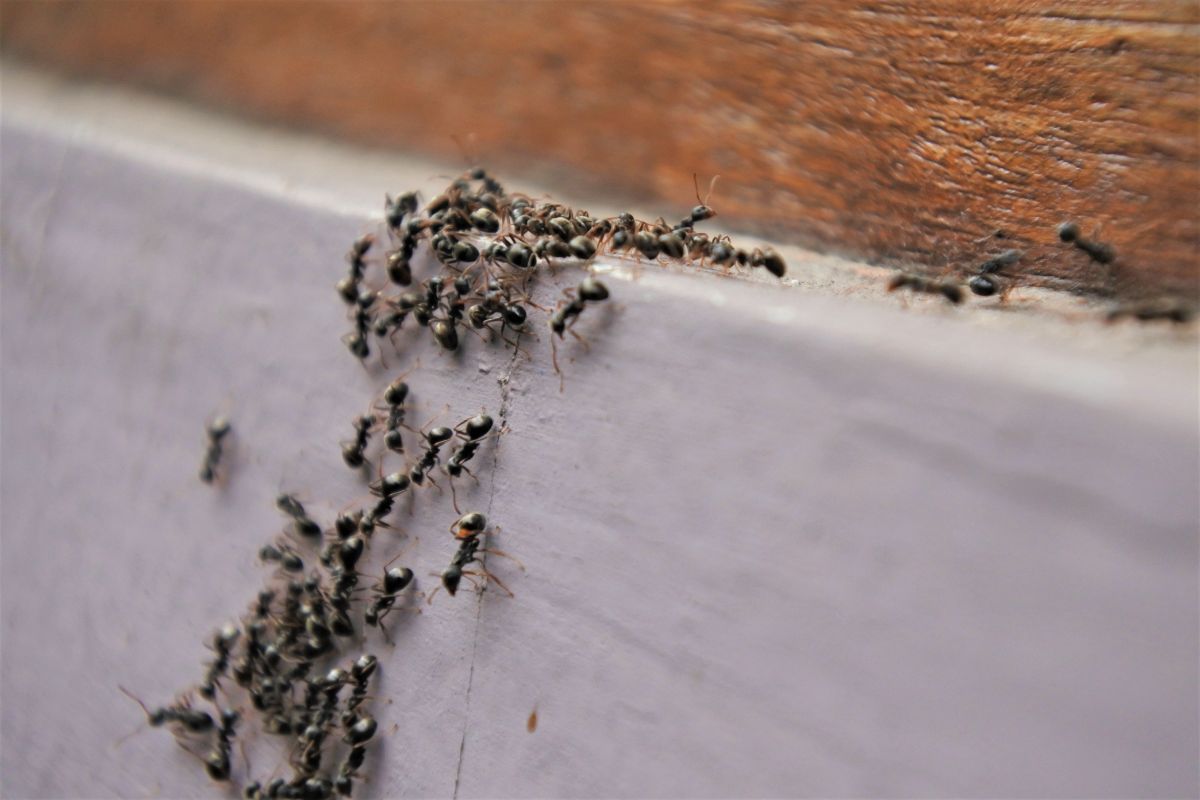
Ants can be beneficial to gardens, but if you have fire ants or carpenter ants on the prowl or if you’d just prefer to not have ants around, there are a few all-natural ways to remove ants from your garden. When properly used, these methods are much more eco-friendly than chemical pesticides, and they are safe to use in organic gardens too!
1. Water often
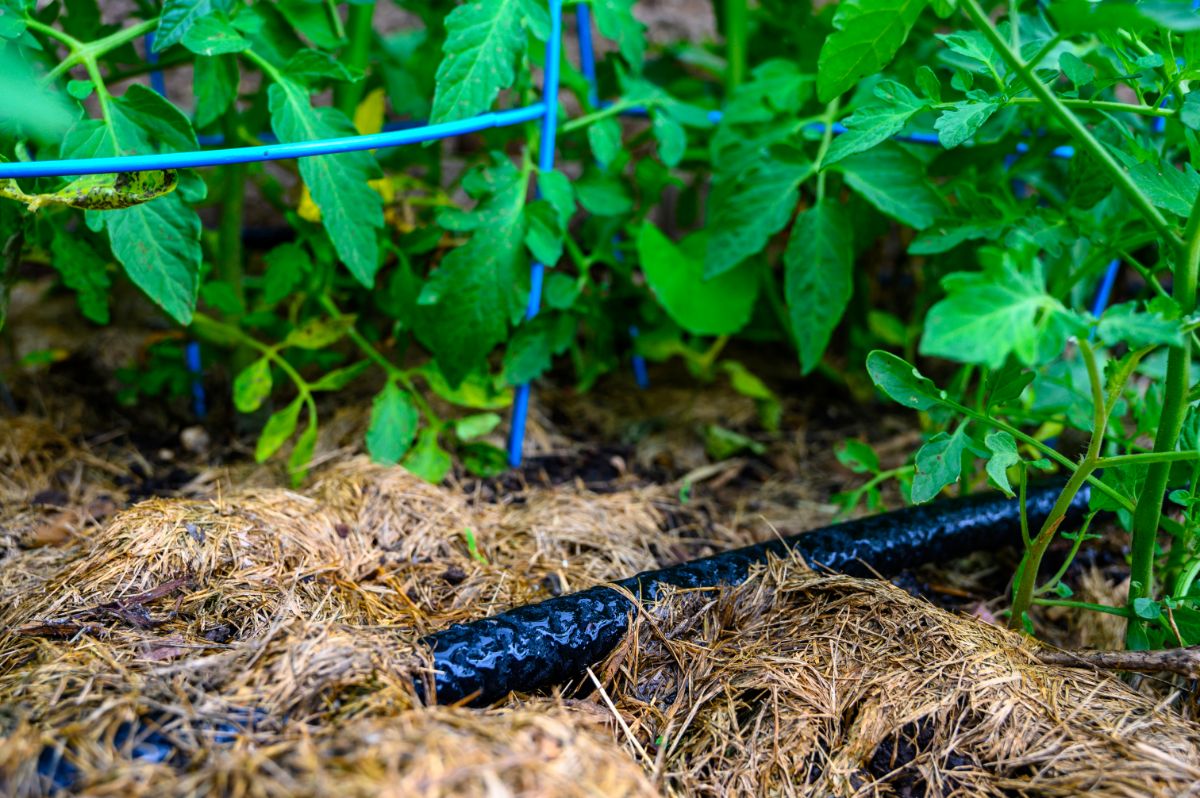
One of the easiest ways to get rid of ants is just to water your garden more often. Ants prefer drier conditions, and wet soil can be too heavy and compact for them to navigate. Increasing how often you water your garden or installing a soaker hose or drip line system can make your landscape less attractive to ants.
While this is a great, no-fuss solution to ant problems, take care not to overdo it and create a soggy garden. You’ll want to increase your watering rate, but not so much that you’re overwatering your garden and plants.
2. Try tilling
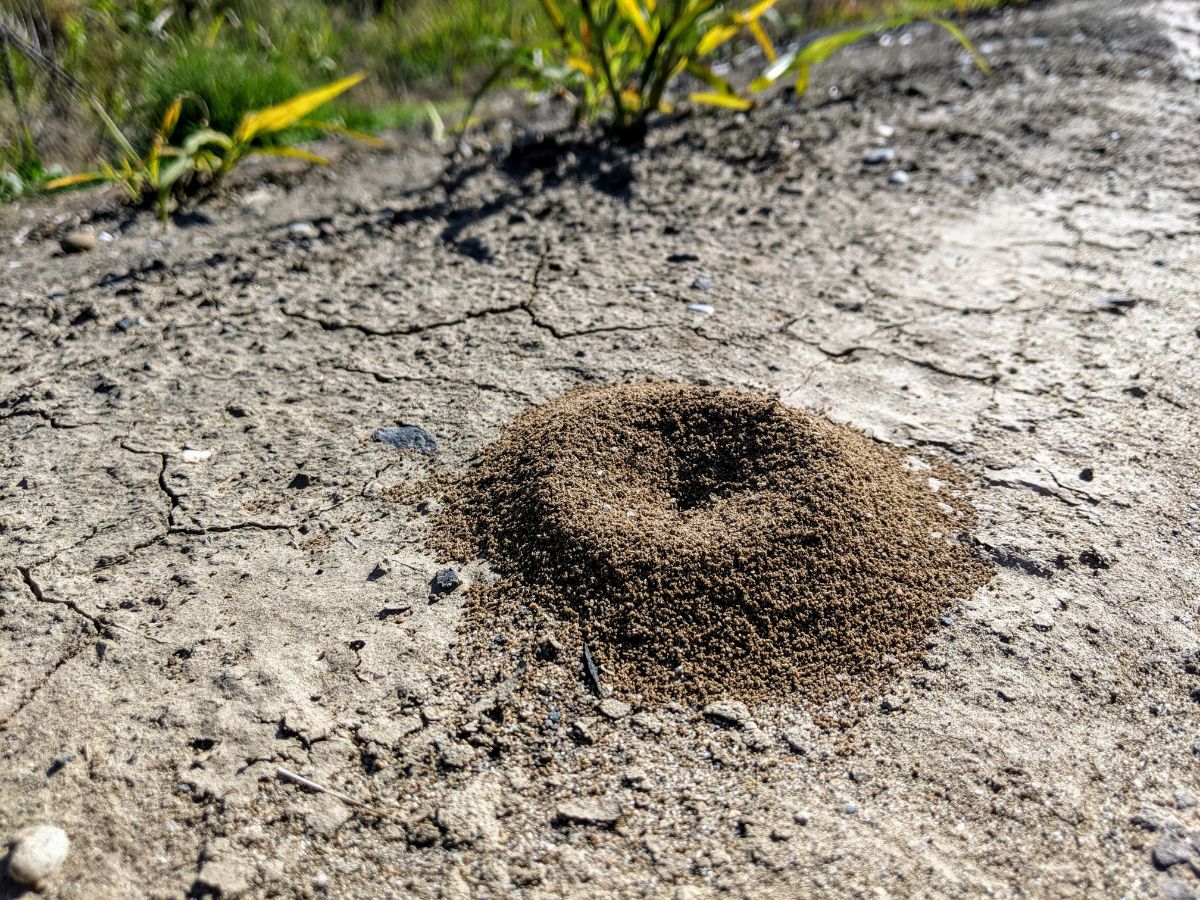
Ants don’t want to build their colonies in earth that’s frequently disturbed. For this reason, if there’s a section of your garden that seems to be attracting unwanted attention from ants, you may want to dig that area up from time to time with a gardening fork or shovel. Disturbing the soil repeatedly will make it less hospitable for ants, and it will encourage them to make their home elsewhere!
3. Remove their food sources
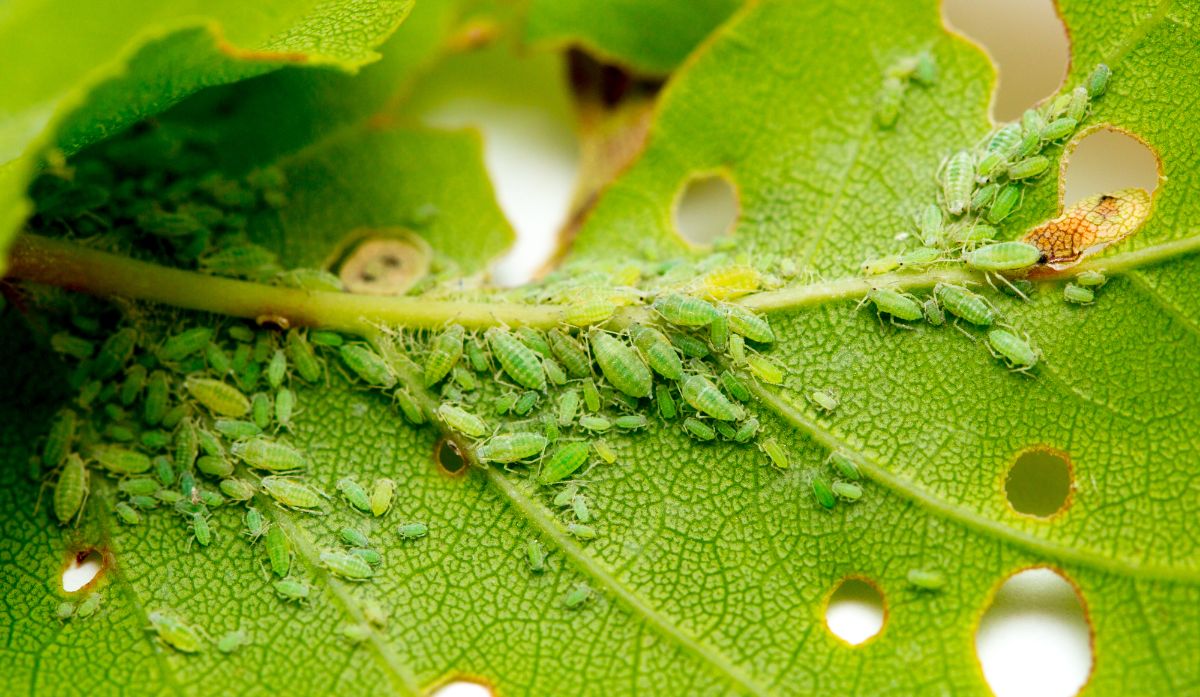
Indoor ants are often drawn to sticky sweet substances, like spilled sugar. But if you clean that sugar up, ants will usually miraculously “disappear.”
The same holds true for outdoor gardens, but instead of worrying about sticky sugar, you need to find the ants’ other food source: sap-sucking insects. Check under the leaves and along plant stems for any signs of aphids, mealybugs, or other pests.
Once you locate the pests the ants are feeding on, you’ll need to treat the affected plant. Aphids can often be dislodged with a strong blast from a garden hose; however, organic soap and neem oil sprays will also work. Just avoid spraying these products on plants in flower, as they can harm bees when improperly applied.
4. Use boiling water
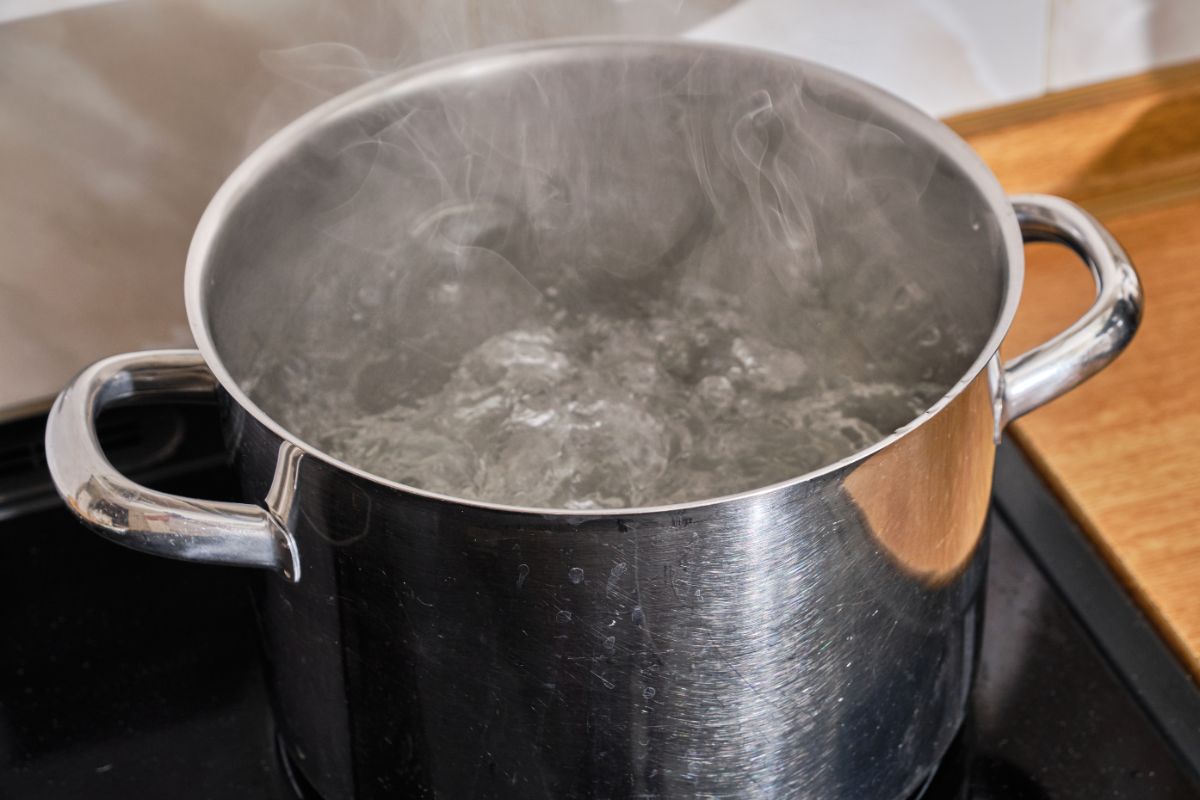
If you happen to know where the ants built their hill, you can tackle the problem right at the source by destroying the ant colony. One way to do this is to boil a large pot of water and then dump the boiling water on the ant hill. For large or established colonies, you may need to repeat this treatment several times, but it is often very effective.
Note: Don’t pour boiling water on any plant you’d like to keep, as very hot water can kill any plant it comes in contact with.
5. Attract natural predators
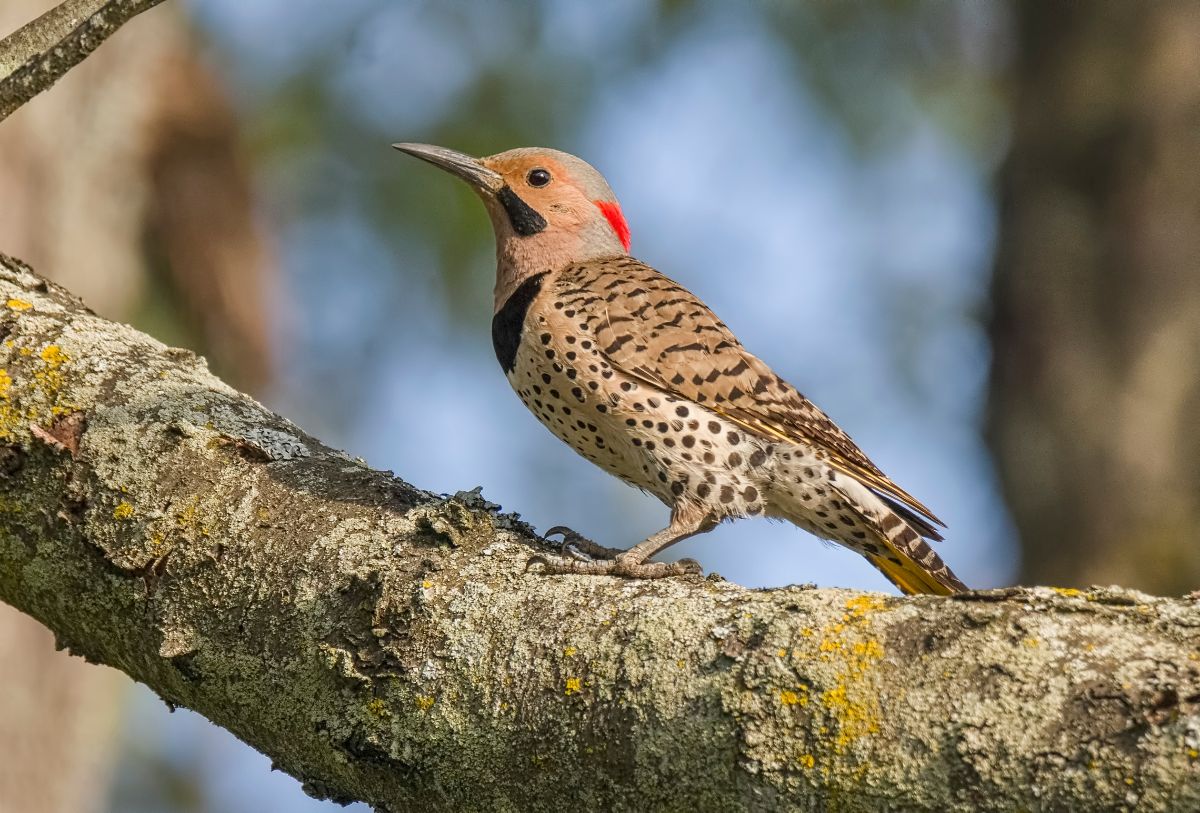
Birds and predatory insects, like spiders, will feed on ants naturally. Installing a bird feeder or bird bath near an ant hill can help keep ant populations in check. Woodpeckers and related birds are particularly fond of ants, so you may want to add some suet to ensure they visit as well.
Keeping your garden as organic as possible will also keep predatory insects healthy and thriving. These “good guy insects” will feed on ants, but they’ll also feed on many other garden pests, including bean beetles, thrips, and grubs.
If you happen to have a flock of backyard chickens, you can also employ your hens to get rid of your ants for you. Just let your feathered friends go near an ant hill, and they will make short work of ants and many other insects too.
6. Apply repellent scents
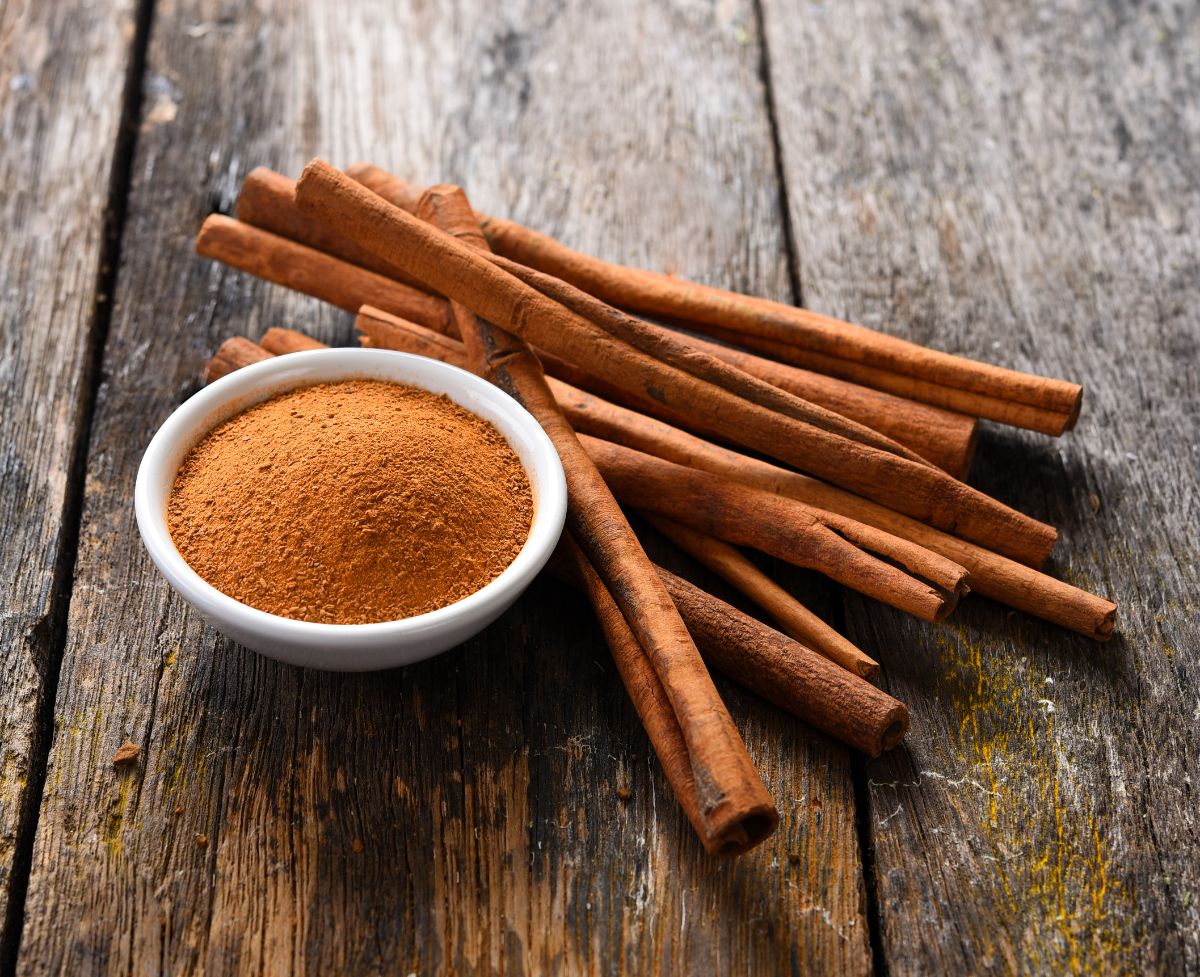
While ants are industrious creatures, there are certain scents that they just don’t like. Spraying or scattering these scented, natural products around your garden can help keep ants away, and some of these products can also repel other common garden pests, including deer, cabbage moths, and cucumber beetles. Just avoid using these products on plants in flower as they may also repel bees and other pollinators.
Some of the scents that are best for repelling ants include cinnamon, nutmeg, black pepper, cayenne powder, peppermint, and citrus. Leaving citrus peels in your garden or sprinkling your soil with cinnamon, nutmeg, or cayenne powder can keep ants away. Organic garden sprays with peppermint oil can also be useful, but these products generally need to be reapplied throughout the season and after heavy rains.
7. Grow companion plants
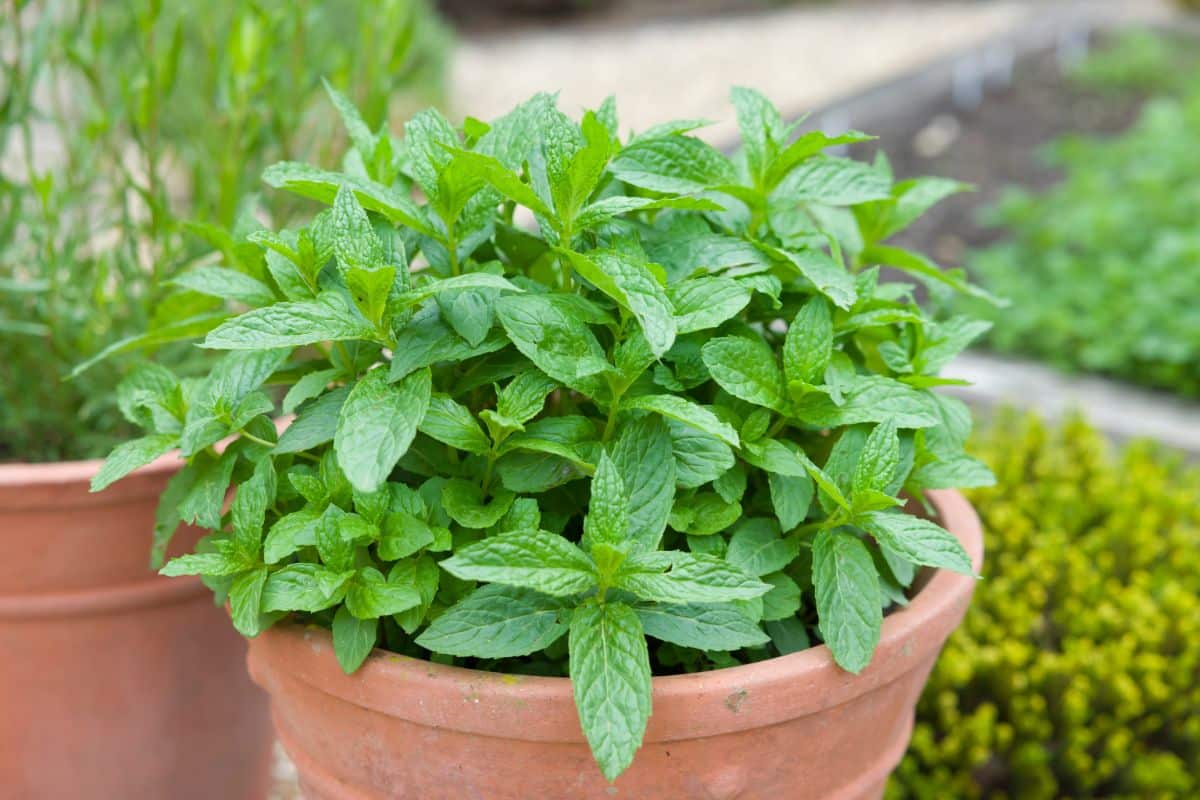
Spraying repellent sprays or sprinkling scented powders can be a quick fix for ant infestations, but these products often need to be reapplied, especially if it rains often in your area. A longer-term solution is to grow companion plants that ants don’t like. Once ants catch the scent of these fragrant plants, they may avoid your garden entirely and move their colony elsewhere.
Some of the best companion plants to grow to keep ants at bay include:
- Peppermint
- Alliums (garlic, onions, leeks, etc.)
- Rosemary
- Thyme
- Catnip
- Yarrow
- Tansy
- Turmeric
- Sage
- Lemongrass
- Pennyroyal
8. Experiment with cornstarch and cornmeal
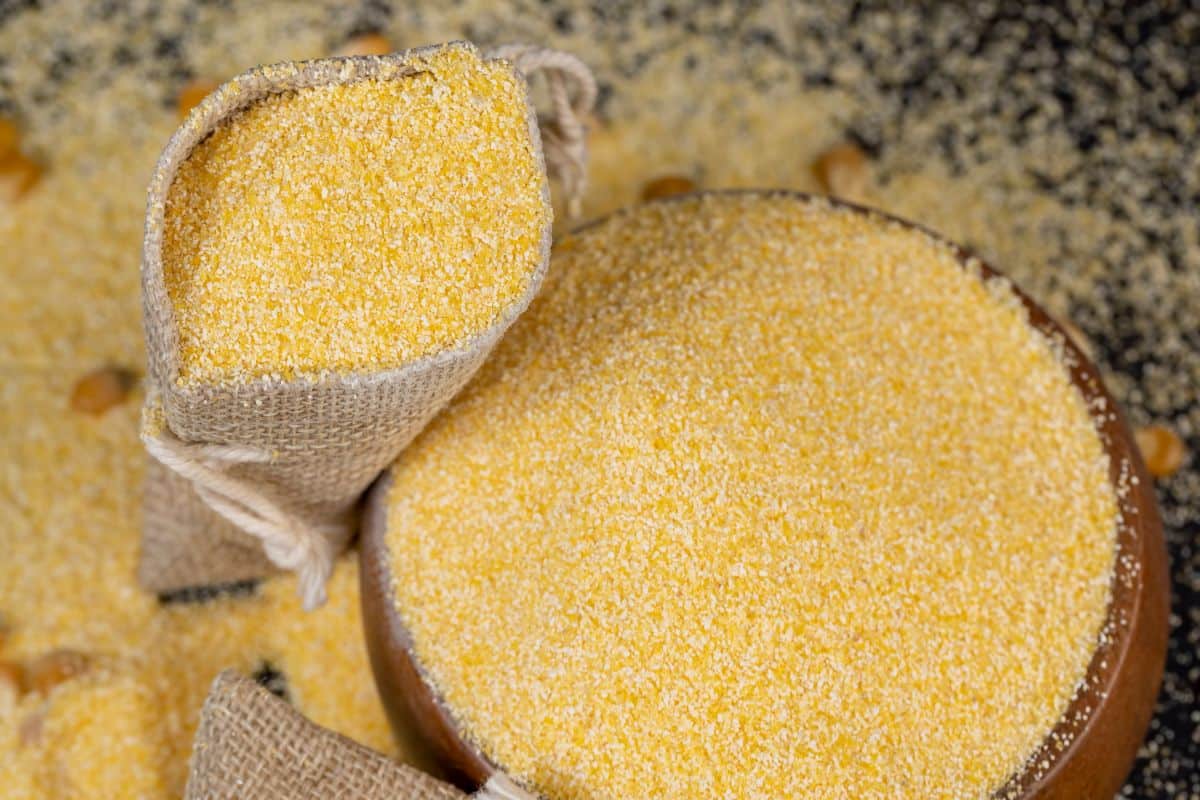
There’s an old legend that says that if you sprinkle cornstarch or cornmeal around your garden, ants will gobble it up, and they’ll explode. As the story goes, ants are unable to digest these products, and so the corn simply expands in their abdomens. While there isn’t any real scientific evidence to support this claim, it is an intriguing idea that you are certainly welcome to experiment with; however, there are other uses for cornstarch and cornmeal that have more reliable results.
Ants love both cornstarch and cornmeal, and these two products can be used as ant bait. One way to use these products for ant removal is to pour a pile of cornmeal or cornstarch in your garden or near a known ant hill. Then when the ants congregate to feed on the bait, you can hoover them up with an insect vacuum.
9. Soap sprays
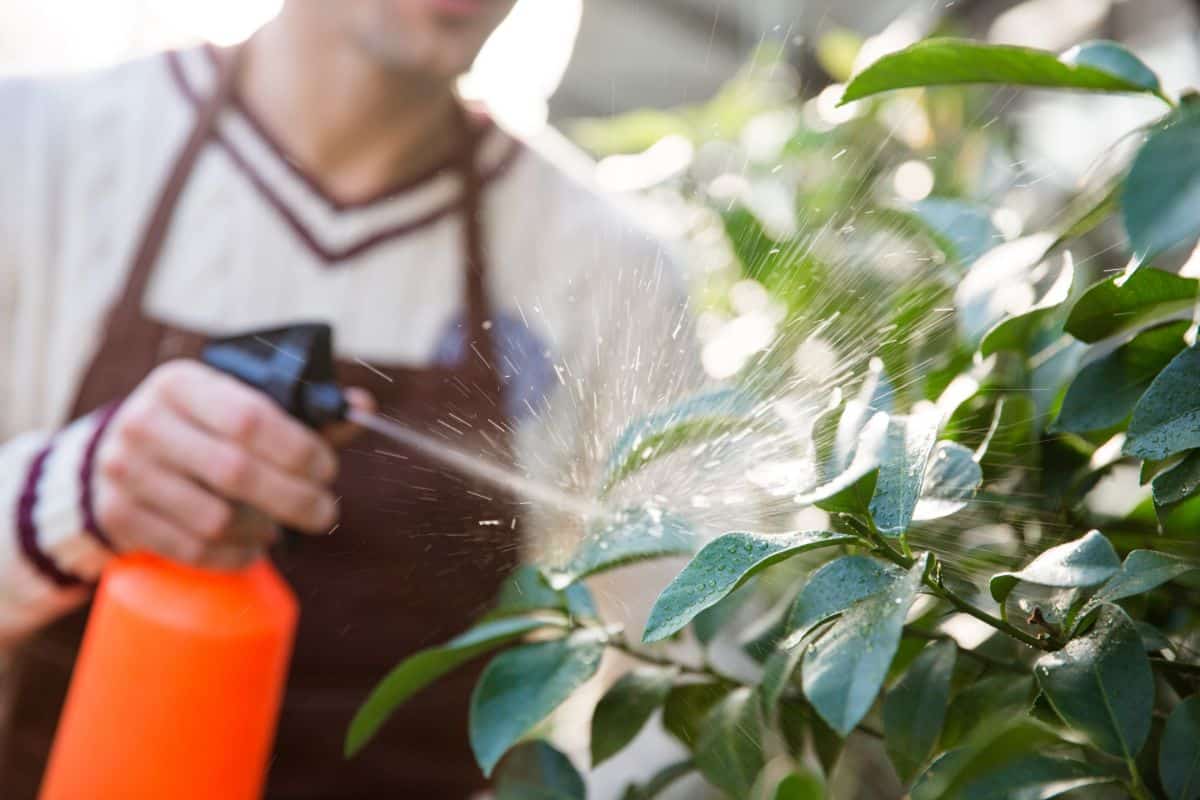
Organic soap and neem oil sprays are effective pest control remedies for a wide variety of garden insects, including ants. Spraying these products on ants can be an easy way to remove a small population of ants, although these sprays will need to be reapplied for larger ant colonies. Keep in mind that both organic soap and neem oil sprays are generalized pesticides, so they should not be sprayed on plants in flower as they can harm non-target insects.
If you’d like to make your own soap spray for pest control purposes, simply mix a few drops of Castile soap into a spray bottle with water. For even more “oomph,” you can also stir in a tablespoon or two of neem oil and then give the concoction a good mix. Apply garden sprays in the evening to avoid potentially damaging your plant leaves with sunscald.
10. Diatomaceous earth
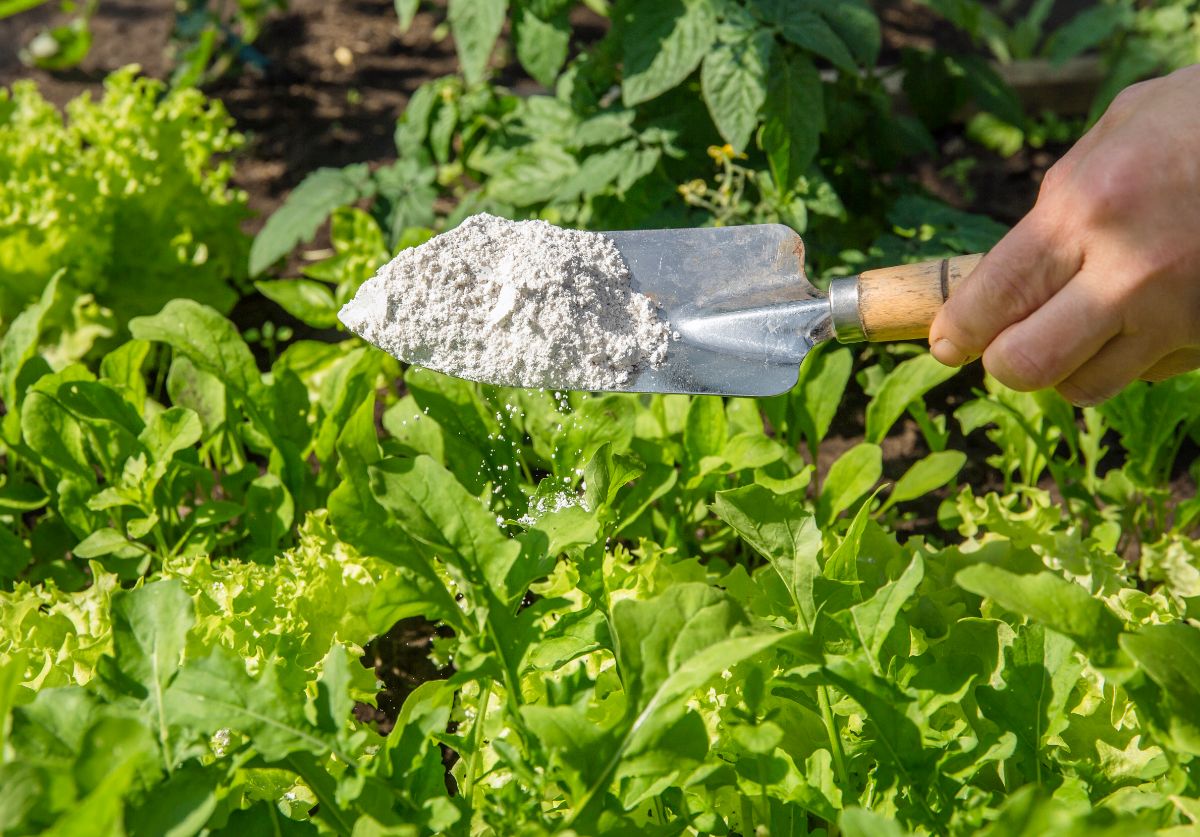
Diatomaceous earth is a popular garden remedy, which can help with pest problems and keep ant populations in check too. This fine, white powder is made from the microscopic and fossilized skeletons of marine creatures known as diatoms. Those fossilized skeletons are very sharp to small insects, and they can shred the exoskeletons of any insect that’s unfortunate enough to walk across a line of diatomaceous earth.
Diatomaceous earth can be sprinkled over ant hills, or it can be spread around the perimeter of garden beds or around the base of plants. This product works best when dry, and it will generally need to be reapplied a few times throughout the growing season and after heavy rains.
Diatomaceous earth is another generalized pesticide that can kill an assortment of insects, including bees. For this reason, care should always be taken with this product, and it should never be applied to plants in flower. Additionally, as diatomaceous earth can cause respiratory irritation in humans, you’ll always want to wear a mask when applying it.
Frequently asked questions
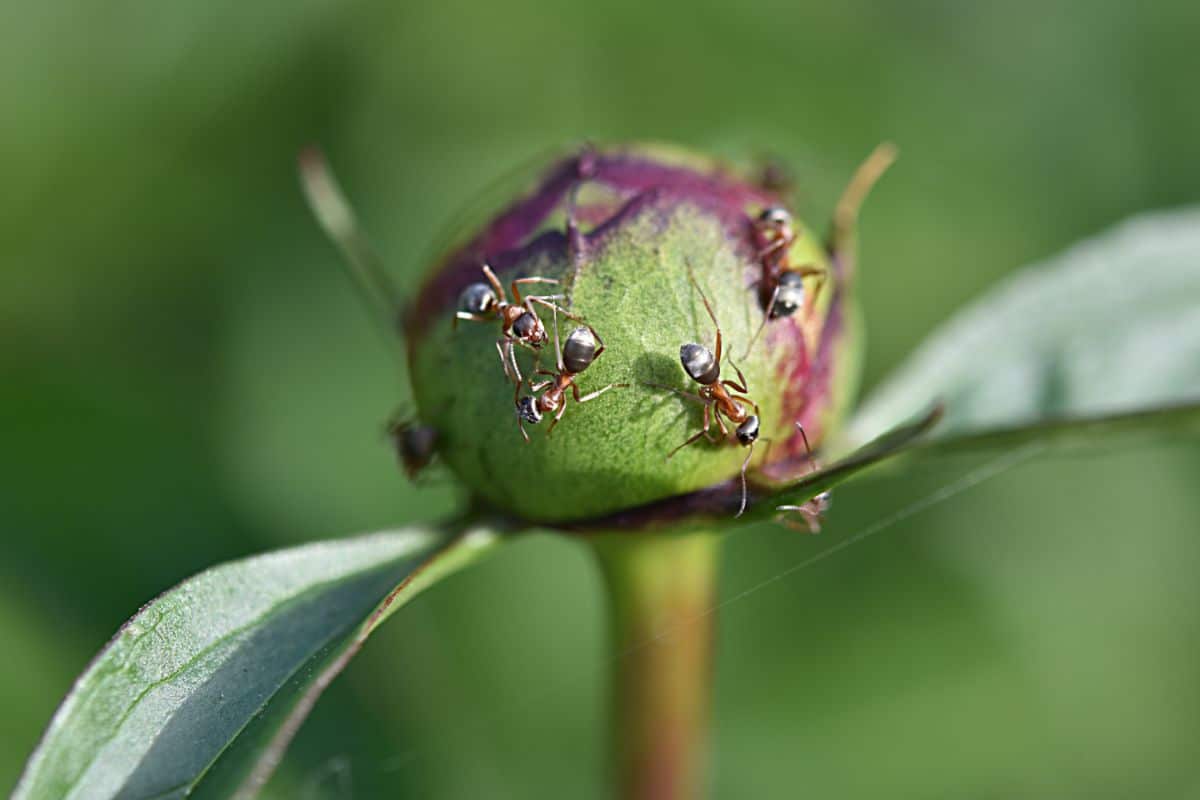
No, ants are neither good nor bad, and some ants can actually benefit your garden. Ants will generally not harm plants, and they can keep pests in check and clean up old plant matter and other garden debris. That said, fire ants and carpenter ants can cause painful bites, and they may destroy property too.
There are many different species of ants that can frequent your garden. One of the most common ants that you’ll find is the black garden ant (Lasius niger), which inhabits many parts of the globe, including the Americas, Europe, and Africa. These ants feed on the honeydew from sap-sucking pests, and they also eat flower nectar and other insects.
Investing in a good insect ID book can help you determine what ants are living in your garden. Key characteristics to look for when identifying ants include the ant’s color, size, and relative shape. Also, note whether the ant has wings or not and if their abdomens are hairy.
Black garden ants are often confused with carpenter ants, but you can tell these ants apart by their size and form. Carpenter ants are larger than most other ant species, including black garden ants. Carpenter ants also have distinct heart-shaped heads.
Ants can offer a lot of benefits in the garden. Ants are nature’s clean-up crew, and they will help remove old plant matter and encourage it to break down faster so that it can release its nutrients into the soil. Beyond that, ants can also keep some pests in check, and they can even plant wildflower seeds!
Ants are always around, but when ants seem to suddenly multiply overnight, it usually means they’ve found a food source. Scout ants travel around in search of food, and when they find it, they notify the colony and lead them to the food with a scent trail. More ants can indicate that the scout ants have located aphids or other sap-sucking insects in your garden, and they’re leading their friends to the easy food source.
Summary
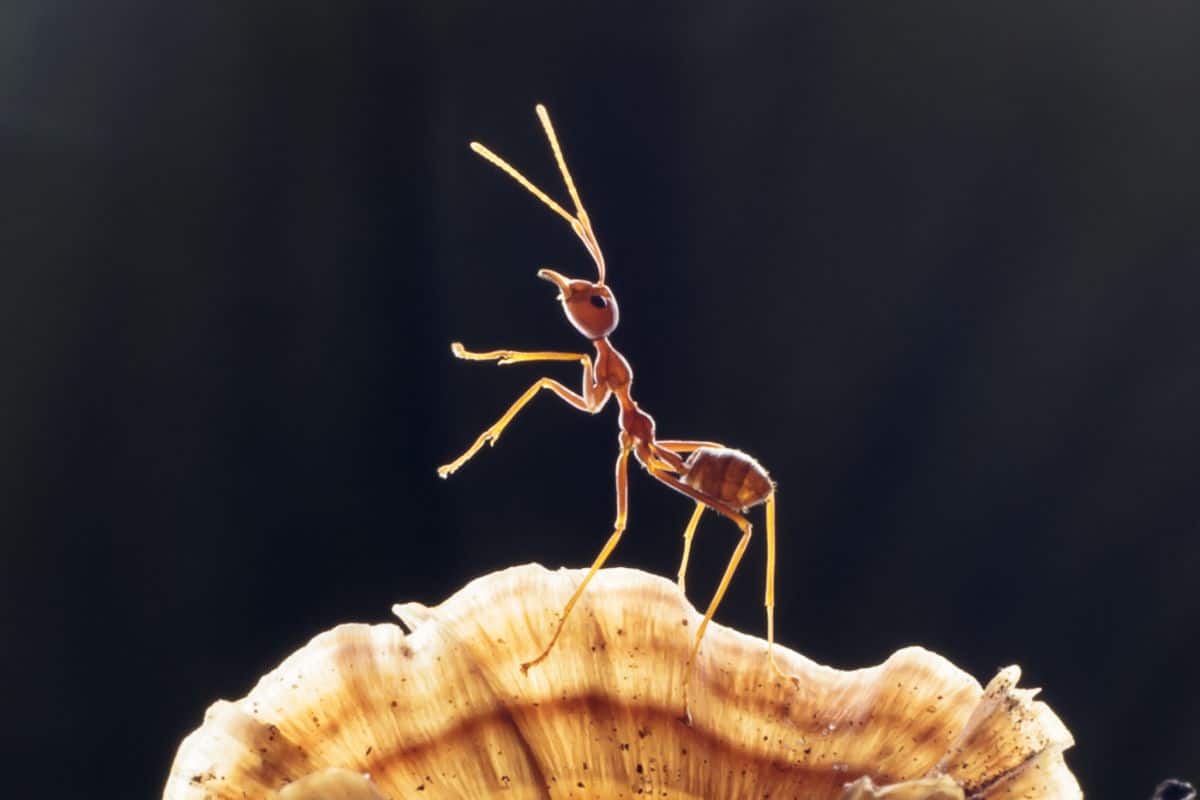
Some garden insects, like cabbage loopers and Colorado potato beetles, can cause a lot of damage to gardens, but ants don’t fall into this category. Like most insects, ants are generally “neutral” creatures in most gardens. Ants can sometimes increase aphid populations, but they also prey on other pests, sow wildflower seeds, and clean up plant litter.
Whether you leave ants in your garden or not is a decision only you can make. However, if you do decide to remove ants from your space, the organic tips we’ve covered today are very effective, and they’re also much safer for local wildlife than chemical pesticides. On the other hand, if you decide to keep ants around, you may find your heart warming to these hardworking little insects!
For more natural pest control ideas, check out our guide on keeping tomato hornworms off your tomatoes, or use these tips to keep deer from gobbling up your veggies.

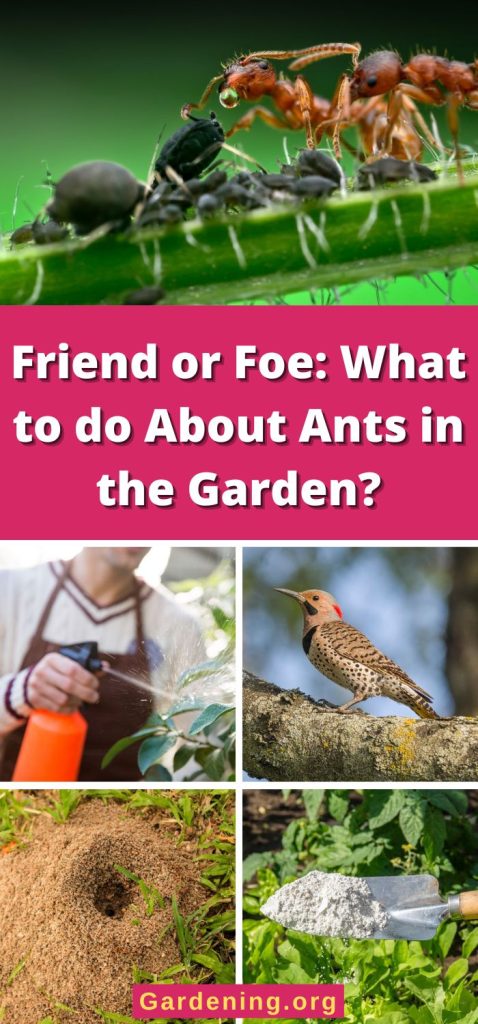
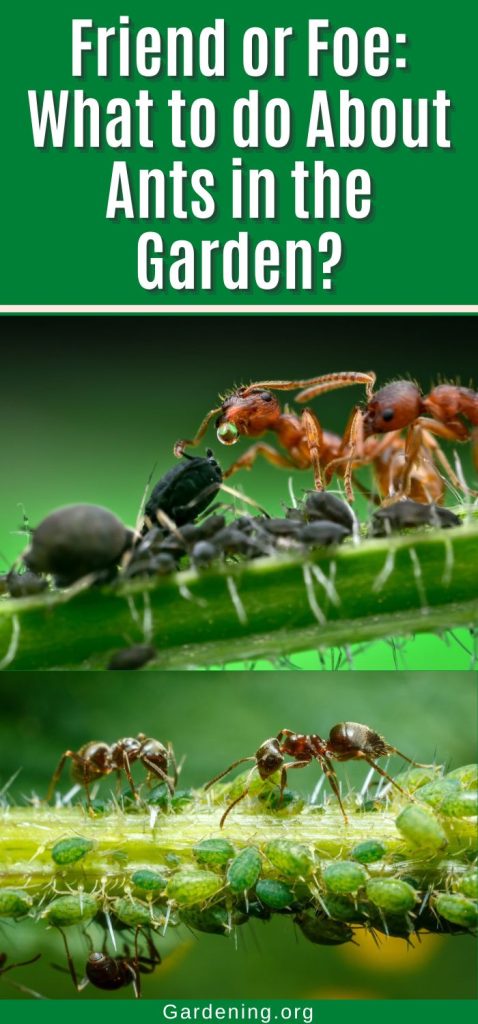
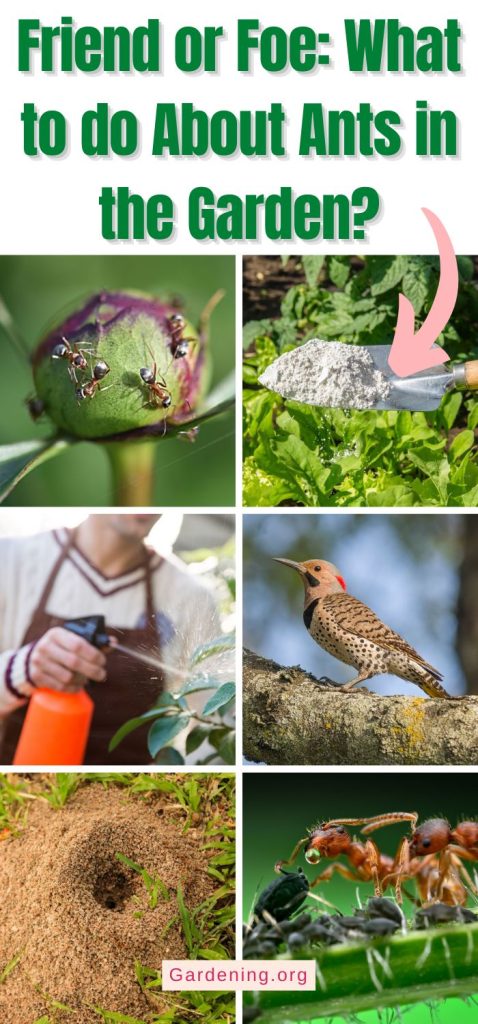
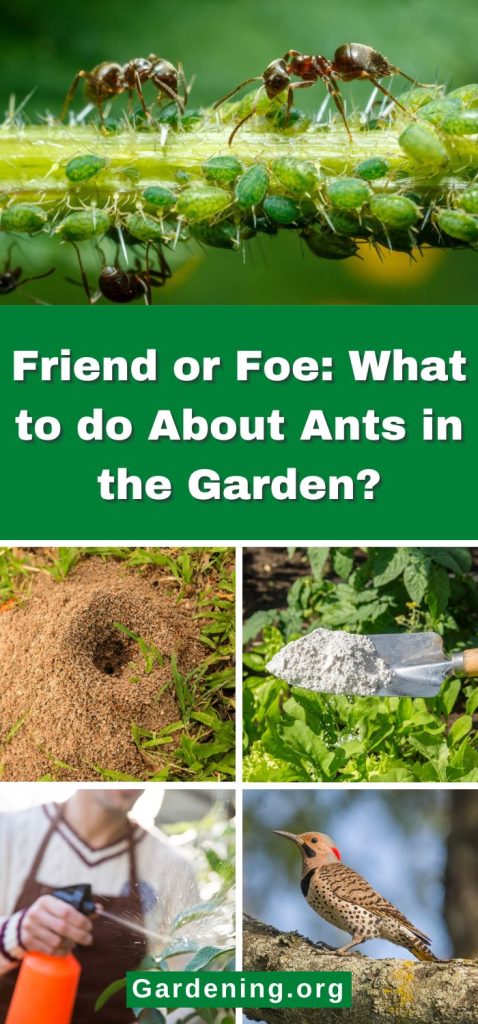
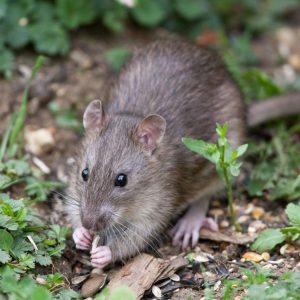
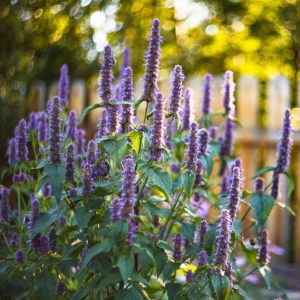

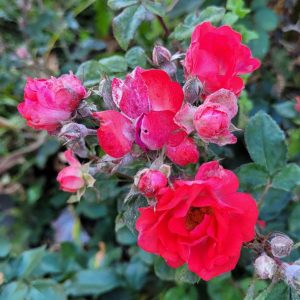
Melody Fleck
Just the article I needed to deal with ants in my garden and better understand why they are there and what's good about them. Thanks!